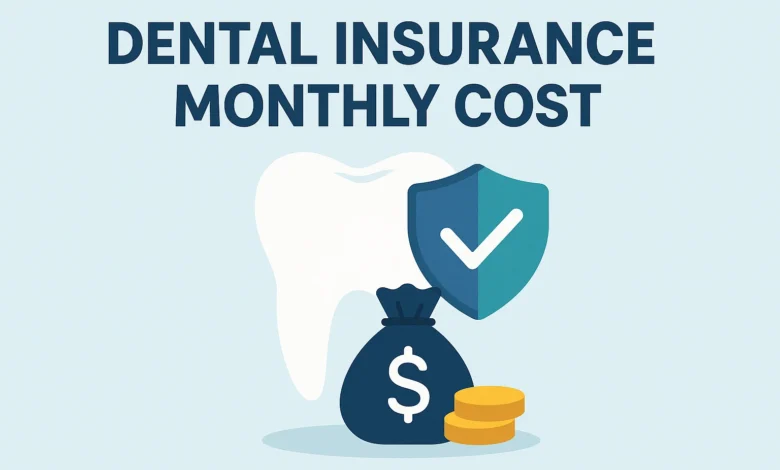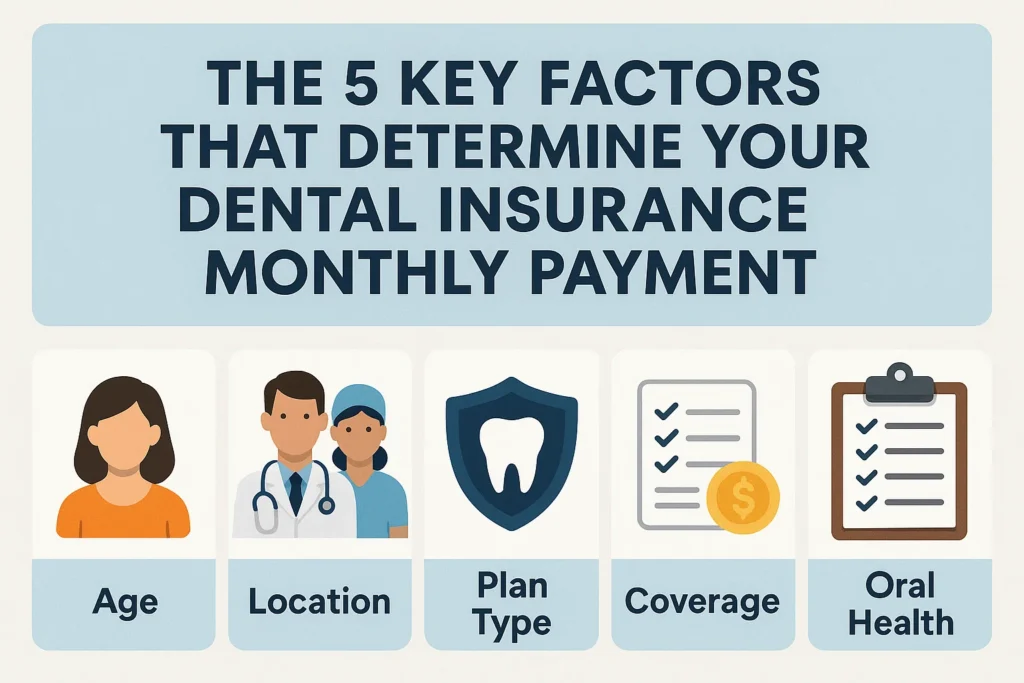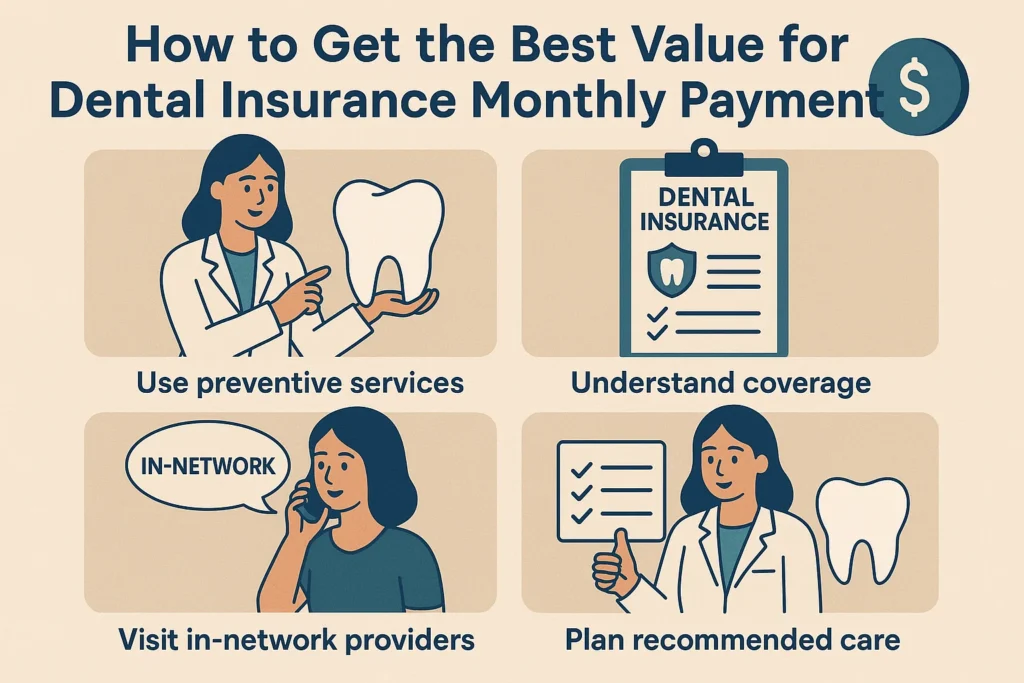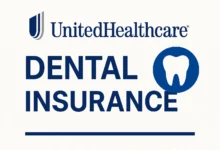Dental Insurance Monthly Cost: Is It Worth the Investment?

Dental Insurance Monthly Cost: Your 2025 Guide to Affordable Coverage
So what is the real cost of a healthy smile? You are not the only one to be confused by the elusive nature of the monthly payment of dental insurance. A 2024 study by the National Association of Dental Plans discovered more than 40 percent of consumers mistakenly believe the cost of standalone dental coverage is less than it actually is, which results in sticker shock and delays in care.
However, the truth is the following: to become financially savvy in the choice to maintain your oral health, the first step to take is to comprehend the average dental insurance monthly payment. This ultimate guide will not only de-mythify the cost, but it will also break down the things that influence your premium and will give you an easy roadmap on how to find a plan that takes care of your smile and your wallet.
National Averages: How much does Basic Dental Insurance Cost per Month?
We will begin with the big picture. In the United States, the average person expends an average of between 25 and 60 dollars per month on dental insurance cover as per a 2025 statistical forecast by ValuePenguin. In the case of family plans, typically consisting of two adults and two children the average monthly premium is between 75 and 200 dollars.
They are only averages however. The real price of the dental insurance monthly payment is very personal. Imagine it is a car purchase–you have a price of the base model but extras, where you live, and the name of the brand all modify the figure. Your premium is mainly due to the following factors.
The 5 Key Factors That Determine Your Dental Insurance Monthly Payment

1. Plan Type: HMO (DHMO) vs. PPO
This is the single most significant factor influencing your monthly dental insurance cost.
- Dental HMO (DHMO): these are the most often affordable ones, and low cost monthly dental insurance premiums are as low as $15-$30 at times. You will use a network of particular dentists in exchange of the reduced price and will typically need a referral to see a specialist. Deductibles are usually nonexistent and the copays are per service.
- Dental PPO: The most popular type of plan is this one. It is more flexible, in that you can visit any dentist, but will pay less going to one inside the network of the plan. This flexibility is more expensive, with average monthly premium of dental insurance cost ranging between $30-60+ per individual. PPOs also generally come with an annual deductible (e.g. $50-100) and yearly maxims.
2. Your Geographic Location
Dental care and the cost of living in your state are directly related and hence the insurance premiums. To illustrate, the monthly premium this dental insurance charges the Texas residents may be less than that of a person in New York City. An average dental insurance cost Texas plan would be between $28-50 per person, but in a high-cost metropolitan area, that particular plan would cost 20-30 more.
3. Your Age
Age may influence your premium although it is not as dramatic as health insurance. The lowest rates usually are in children and young adults. The premiums can be raised on persons with ages exceeding 50 years, since they have a higher chance of needing complex operations such as crowns, or braces.
4. Level of coverage (and annul maximum)
How much does the plan pay out? The annual maximum represents the sum of money that the insurance company will pay in yearly benefits towards your dental care. A plan with a limit of less than 1,000 will be cheaper a month than a plan with a limit of less than 2,000. Equally, the plans having a larger coverage of major procedures (such as crowns at 50 percent compared to 40 percent) will come with a higher premium.
5. The Insurance Carrier
Network size, brand reputation and customer service are all contributing factors. An insurance monthly payment with Delta Dental may be a bit more expensive than a lower-recognized local carrier since Delta usually has the most significant pool of dentists. Likewise, MetLife dental insurance monthly rate or Cigna dental insurance monthly rate will be indicative of their respective plan design and country coverage.
Dental Insurance Monthly Cost: A Side-by-Side Comparison
| Plan Type / Carrier | Estimated Individual Monthly Cost | Typical Annual Maximum | Best For |
|---|---|---|---|
| DHMO (Basic Plan) | $15 – $30 | N/A (Copay-based) | Budget-conscious individuals who don’t mind a defined network. |
| PPO (Value Plan) | $30 – $45 | $1,000 – $1,500 | Those wanting a balance of cost and choice of dentist. |
| PPO (Premium Plan – e.g., Delta Dental) | $45 – $70+ | $1,500 – $2,000+ | Individuals anticipating major work or who want maximum flexibility. |
| Indemnity Plan | $50 – $100+ | Varies | Those who want complete freedom to choose any dentist without a network. |
Dental Insurance vs. Dental Discount Plans: A Critical Cost Analysis
You will probably come across dental discount plans when you are searching a low dental plan monthly cost. It is important to have the distinction.
- Dental Insurance: You make monthly premium payment. The insurance company also covers the costs of your care in accordance to the provisions of the plan (e.g., 100% of preventive, 80% of basic, 50% of major) to the maximum of the annual coverage.
- Dental Discount Plan: You pay an annual or monthly fee (which is usually quite low, e.g. 10-15/month). It is not paying to any services. Rather, it provides you with a list of dentists that have offered to discount their services (e.g., 20% off a crown) to you.
- Expert Tip: Discount plan may be a good idea when you need basic treatment and are not insured, however, it does not replace the insurance in case you expect some crown, root canal, or other costly process. The average cost of the dental plan can be low with out of pocket liability being high.
How to Get the Best Value for Your Dental Insurance Monthly Payment

Finding the right plan isn’t just about the lowest premium. It’s about value. Follow this 4-step strategy to ensure you’re making a smart purchase.
Step 1: Assess Your Actual Dental Needs
Be honest with yourself. Are you a person who just requires two cleanings and a check up annually? Or is it that you are having a root canal or an implant? A low-price DHMO or a simple PPO could be an ideal solution; however, in case of preventive care only, it could be ideal. In case you are aware that you will need big work, then you will save on a bigger premium, though with a higher annual limit.
Step 2: Scan the Provider Network.
Do you have a dentist you love? It is also a good idea to call their office and inquire which insurance carriers and specific PPO plans they are in-network with before buying a plan. It is no use opting to have a low monthly fee plan at the expense of leaving a trusted provider.
Step 3: Look Beyond the Premium
Scrutinize the fine print:
- Deductible: How much must you pay out-of-pocket before insurance kicks in?
- Annual Maximum: This is the cap on what the insurer will pay. Once you hit it, you pay 100%.
- Waiting Periods: Many plans have waiting periods (e.g., 6-12 months) for major procedures. Avoid these if you need immediate work.
Step 4: Shop and Compare Quotes
Compare quotes online with various (such as Aetna, Anthem, Cigna) carriers using online marketplaces (such as the ACA marketplace or eHealth). This is the sole method in order to accurately see how the monthly cost of dental insurance compares to the same amount of coverage in your region.
Floss Picks vs Floss Threaders: Which One Is Right for You?
Frequently Asked Questions (FAQ)
Q: How much is good dental insurance a month?
A: An average PPO plan, providing a strong network, a $1500 year limit, and an average cost of basic and major procedures will generally cost an individual between 35 and 60 a month. What is good would be determined by your needs and budget.
Q: Is it worth the monthly price of dental insurance?
A: For most people, yes. When you take the preventative care (cleanings, exams, X-rays) which is generally 100% covered, you save the amount you usually spend on annual premiums and then some. It is also a significant safeguard in connection with unforeseen processes such as a root canal, which may cost more than 1000 dollars without insurance.
Q: How much does an average dental insurance cost per year?
A: The average monthly cost multiplied by the number of months (25-60) and then multiplied by 12 months leads to an average annual cost of a person of 300-720. Family plans cost between 900 to 2400 and above every year.
Q: Which is the average cost of dental insurance in the UK and the USA?
A: It is hard to make direct comparison because of the dissimilar healthcare systems. The average cost of private dental insurance in UK commonly augments the NHS services in the UK. Nonetheless, privacy plans are between £15-50+ each month, which is largely comparable in the US as it depends on exchange rates and the cost of living disparities.
Q: Is there no waiting period to dental insurance?
A: Yes, but it’s less common. There are no waiting periods on preventive and basic care in some plans, but nearly all of them have them on major work. When you have a serious job to be done right now, find some plans that promise no waiting line at all or a dental discount plan may be a temporary solution.
Conclusion: Making an Informed Decision on Your Dental Insurance
Knowing the monthly dental insurance cost is not necessarily knowing a figure, but it is rather knowing the value proposition. Low premium may appear appealing, however, high out-of-pocket expenses may be incurred when you require care. The premium may be an excellent investment, considering it is offering you the coverage and network access that you require in terms of oral health in the long term.
The complicated nature of insurance should not make you stop receiving the care you deserve. Through needs assessment, plan comparison and right questions, you are able to identify a plan that suits your budget and that helps protect your smile.
The next step is quite obvious: Get personal quotes. You will spend 15 minutes in an insurance comparison site, enter your zip code and the monthly rate of real-time dental insurance on the plans available in your neighborhood. This single action step will take you out of the uncertainty to confidence.



